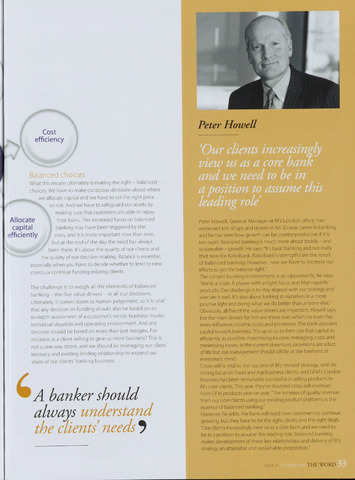A banker should
always understand
the clients needs 5
Our clients increasingly
view us as a core bank
and we need to be in
a position to assume this
leading role
Peter Howell
Cost
efficiency
Allocate
capital
efficiently
Balanced choices
What this means ultimately is making the right - balanced -
choices. We have to make conscious decisions about where
we allocate capital and we have to set the right price
0n risk. And we have to safeguard our assets by
making sure that customers are able to repay
their loans. This increased focus on balanced
banking may have been triggered by the
crisis, and it is more important now than ever,
but at the end of the day the need has always
been there. It's about the quality of our clients and
the quality of our decision making. Balance is essential,
especially when you have to decide whether to lend to new
clients or continue funding existing clients.
The challenge is to weigh all the elements of balanced
banking - the five value drivers - in all our decisions.
Ultimately, it comes down to human judgement, so it is vital
that any decision on funding should also be based on an
in-depth assessment of a customer's sector, business model,
individual situation and operating environment. And any
decision should be based on more than just margins. For
instance, is a cliënt willing to give us more business? This is
not a one-way street, and we should be leveraging our cliënt
intimacy and existing lending relationship to expand our
share of our clients' banking business.
4
Peter Howell, General Manager at RI's London office, has
witnessed lots of ups and downs in his 30-year career in banking,
and he has seen how growth can be counterproductive if it is
too rapid. Balanced banking is much more about steady - and
sustainable - growth. He says: "It's basic banking and not really
that new for Rabobank. Rabobank's strengths are the result
of balanced banking. However, now we have to increase our
efforts to get the balance right."
The current banking environment is an opportunity, he says.
"We're a triple A player with a tight focus and high-quality
products. Our challenge is to stay aligned with our strategy and
execute it well. It's also about looking at ourselves in a more
positive light and doing what we do better than anyone else."
Obviously, all five of the value drivers are important, Howell says,
but the main drivers for him are those over which his team has
more influence: income, costs and provisions. The bank allocates
capital to each business. "It's up to us to then use that capital as
efficiently as possible, maximising income, managing costs and
minimising losses. In the current downturn, provisions are a fact
of life but risk management should still be at the forefront of
everyone's mind.
Cross-sell is vital to the success of RI's revised strategy, with its
strong focus on Food and Agribusiness clients, and GFM's London
business has been remarkably successful in selling products to
RI's core clients. This year, they've doubled cross-sell revenues
from GFM products year on year. 'The increase of quality revenue
from our core clients using our existing product platforms is the
essence of balanced banking."
However, he adds, the bank will need new customers to continue
growing, but they have to be the right clients and the right deals.
"Our clients increasingly view us as a core bank and we need to
be in a position to assume this leading role. Balanced banking
makes development of these key relationships and delivery of RI's
strategy an attainable and sustainable proposition."
ISSUE 21
THE WORD

